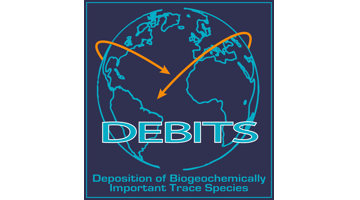Deposition of Biogechemically Important Trace Species (DEBITS)
Wet and dry deposition of chemical species to the earth’s surface plays an essential role in controlling the concentration of gases and aerosols in the troposphere. The chemical composition of atmospheric deposition provides important information on many interacting physical and chemical mechanisms in the atmosphere such as emission sources, atmospheric dynamics and transport, atmospheric removal processes, and nutrient cycling in ecosystems. Long-term research on deposition thus provides critical information on natural and anthropogenic influences on the atmosphere and provides information on the temporal and spatial evolution of atmospheric chemistry. Phase I of DEBITS, which was initiated in 1990 under the first phase of IGAC, focused on the development of an international measurement network of stations to monitor the wet and dry deposition of biogeochemically important trace species. As a result of Phase I, DEBITS stations are of the highest data quality and assurance, following the WMO/GAW data quality objectives. In Phase II, the DEBITS science community has adopted a twofold approach to maintain the present operational structure of DEBITS and to support a new integrated approach to deposition flux measurements and impact studies. Despite the efforts of the DEBITS Task and other research, wet and especially dry deposition remains a large unknown in the chemical budget of the atmosphere. The IGAC SSC believes there is still a strong need for international collaboration and integration of research on atmospheric deposition, especially in implementing and maintaining long-term monitoring networks and understanding the chemical/physical properties of deposition.
The main scientific questions DEBITS aims to address are:
- What are the evolutions of the chemical atmospheric composition at the regional scale of the tropical ecosystems?
- What are the atmospheric removal rates by dry and wet deposition on a temporal and spatial basis at a regional scale around the world?
- What are the key regulating processes that affect deposition rates and atmospheric chemistry in different regional environments?
- What are the role of heterogeneous chemical processes (gaseous and particulate phases) on deposition characteristics?
- What are the regional scale atmospheric budgets of key elements: C, S and N cycles?
- How can the use of numerical models assist quantifying relationships between emissions and depositional fluxes?
- How can deposition flux measurements be related to impact studies (focus on nitrogen and other key species on ecosystems and hydrology)?
DEBITS helps the development of expertise in order to assist the global atmospheric chemistry society to be solution-orientated, while it also aims to link environmental change and development challenges to satisfy human needs for food, water, energy and health by embracing an interdisciplinary collaboration approach.
For more information, please see the DEBITS website at http://Debits.sedoo.fr.
